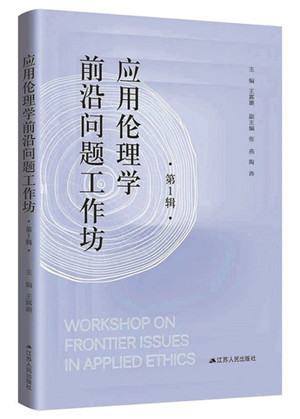
. > WHAT'S NEW > BOOKS
Frontier issues of applied ethics
Author : WAN JUNREN Source : Chinese Social Sciences Today 2023-01-15

Workshop on Frontier Issues in Applied Ethics
The first volume of Workshop on Frontier Issues in Applied Ethics, under the chief editorship of Wang Lulu, a professor from the School of Public Administration at Nanjing Normal University, consists of the collated content of 10 workshops on keen themes and frontier issues.
Presiders and participants of the workshops were impressive due to their linguistic logic and theoretical argumentation. Around the confusion in “The Story of Qiu Ju,” scholars made an in-depth multidimensional theoretical analysis of the conflict of etiquette and law in the governance of rural society in China today. The Japanese “Minister of Loneliness” triggered the ethical discussion of the virtual/network society and the concept of being “alone together.” Ethical diagnoses were made on the latest life and health ethical issues such as surrogacy, nurse robots, and euthanasia. Scholars conducted panel discussions on the well-being of the elderly in the context of an ageing population. In addition, animal ethics proceeded from the case of “extracting bile from live bears.” They also delved into individual morality and privacy in the era of big data and the moral and ethical risks that autonomous driving may bring.
The particularity of contemporary applied ethics firstly lies in the pluralistic differentiation of the field, as well as the complex equipment and support of specialized scientific and technological knowledge. This is determined by the rapid differentiation of multi-level and multi-field modern social life itself and by the increasingly technological development of differentiated life fields. Morality is based on and comes from life. The moral and ethical challenges brought about by the modern evolution of human living practices are structural and of fundamental significance.
The trends of specialization and science and technology modernization are increasingly strong, accordingly raising the basic requirements for scholars of applied ethics: specialization and the equipment of scientific and technological knowledge. These demands are increasingly obvious and rigorous. It is hard to imagine that a person who does not possess the most basic knowledge of modern biological/life science, medicine, and public health management is capable to engage in the research or management of bioethics and public health ethics. Similarly, a person who lacks a basic understanding of modern computer science or information network technology is unlikely to work on such ethically challenging issues as intelligent robots.
Even in seemingly less “technical” field of applied ethics, such as rural folk custom ethics, economic and management ethics, ecological/environmental ethics, and animal ethics, specialized research is also impractical without technical knowledge equipment or working methods necessary in professional fields such as anthropological fieldwork, the research methods of econometrics, institutional economics, and statistics, geophysical knowledge, zoological and botanical knowledge. This seems to be an unarguable, unquestionable contemporary academic qualification.
Wan Junren is a professor from the Department of Philosophy at Tsinghua University.
Ye Shengtao made Chinese fairy tales from a wilderness
Ye Shengtao (1894–1988) created the first collection of fairy tales in the history of Chinese children’s literature...
-
How northern ethnicities integrated into Chinese nation
2023-09-18
-
Mogao caves
2023-09-12
-
Mogao Grottoes as ‘a place of pilgrimage’
2023-09-12
-
Time-honored architectural traditions in China
2023-08-29
-
Disentangling the civilizational evolution of China
2023-08-28
-
AI ethics in science fiction
2023-08-23













 2011-2013 by www.cssn.cn. All Rights Reserved
2011-2013 by www.cssn.cn. All Rights Reserved